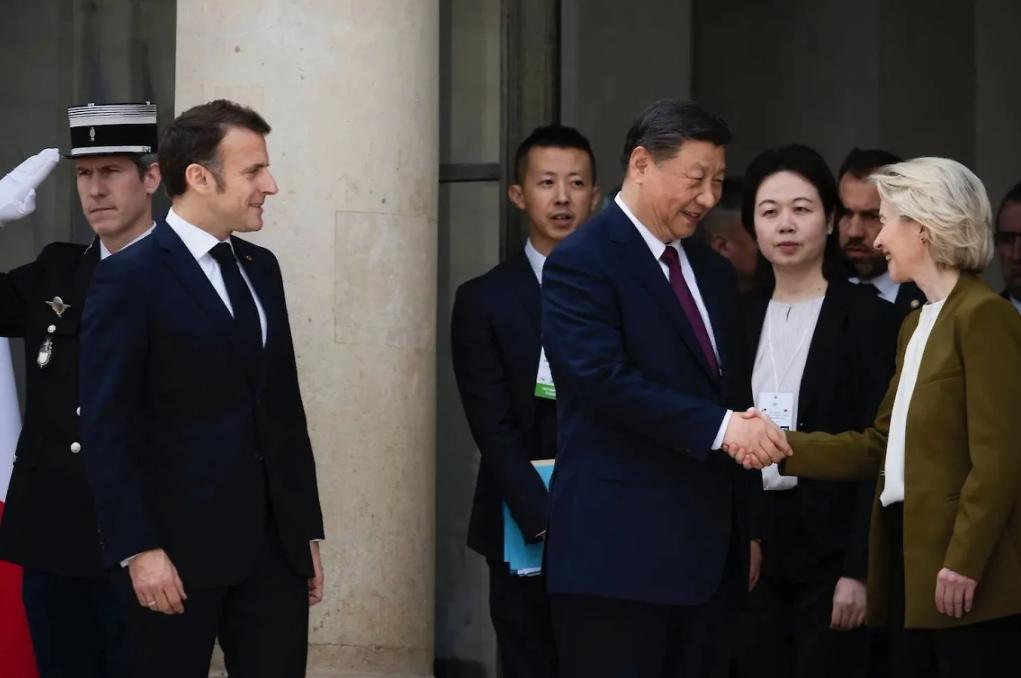Friction, diplomacy in Beijing-Paris/Brussels relations Chinese president’s European tour
One of the topics discussed by analysts of various colors this week was undoubtedly the visit of Chinese President Xi Jinping to Paris, where he held meetings not only with his French counterpart Emmanuel Macron, but also with Ursula von der Leyen, the first person in the European Commission. The rather lengthy talks, however, did not result in the signing of any significant economic agreements. Although Macron tried to entice the Chinese leader with the informal background of the visit (along with the official part of the program).
By and large, the talks were based on disputes, albeit mostly of a trade nature (flavored by a discussion of Beijing's influence on the Russian-Ukrainian war). In brief, the head of the European Commission once again expressed her dissatisfaction with the "green" technologies coming from China to the European continent at inexpensive (compared to European) prices. This was characterized as "unfair competition", hitting EU producers. Moreover, Brussels believes that these prices Chinese companies are helped to keep by state support.
Von der Leyen stated in a rather harsh manner that she unequivocally rejected this state of affairs, which would force the EU to protect its business by enacting "tough decisions”.
Macron, however, acted in his own style. With one hand, so to speak, he voted for von der Leyen's position, and the other hand did not take any action, while Beijing announced the suspension of the plan to raise tariffs on French cognac until the completion of the investigation initiated by the relevant Chinese structures in response to a number of trade restrictions against the business of companies from the Celestial Empire (were declared by the EU in late 2023 - early 2024). In fact, exports of cognac from France to China, according to data cited by various sources, account for almost 20 per cent of all exports of this type of alcohol from the country.
Thus, although Xi Jinping wisely characterized in an Oriental way the negotiations with the EU leaders as fruitful, in reality only small (or even medium-sized) contracts with French companies were signed. Among them is the construction of new subway lines in a number of Chinese cities. That is why we should not be surprised at the gratitude to the President of the People's Republic of China, which was voiced by the master of the Elysee Palace. Although, of course, the aforementioned agreements did not arise out of nothing. Paris has openly declared its interest in the presence of Chinese factories in the country, the profile of which is the production of electric cars.

And here Macron did not change himself with his duplicity, including in relation to allies. The topic of Chinese electric cars is one of the most painful for the EU, in which case Brussels accuses Beijing of state support for this type of business, which allows Chinese businessmen to set the price of products at almost 20 per cent below their European "car brothers". That confidently deprives European businessmen of billions of dollars in profits. But does Macron care about these figures when it comes to his ambitions?
There is no doubt that Macron also benefited from Beijing's readiness to work with Paris to stop all military activities on the planet for the duration of the Olympic Games, as announced by Xi Jinping. Surely even a cursory glance at the results of Xi Jinping's visit to France (taking into account his meeting with Ursula von der Leyen) indicates significant problems in the relationship between China and the European Union. First of all, this manifested itself in Brussels' open warning about the possibility of Europeans tightening trade nuts on the Beijing-EU line. As summarized by the head of the European Commission, fair trade can become only with reciprocal access to each other's markets, "without protectionism and subsidies".
Perhaps this "trade misunderstanding" was somewhat sweetened by Xi Jinping's statement that Beijing would refrain from selling to Moscow technologies that in one form or another could help the Russian defence sector achieve its goals in Ukraine.
Von der Leyen also recognized China's positive role in "de-escalating Russia's irresponsible nuclear threats."
However, as a number of news agencies emphasized, the Chinese leader once again avoided openly condemning Russia's policy toward Ukraine during his visit despite Macron's plans to hear about it from Xi Jinping.
As is well known, Xi Jinping's European trip was not limited to a visit to France. But his talks in Serbia and Hungary had a completely different subtext and character.
This is the subject of the next article.
Teymur Atayev, specially for Caliber.Az
The views and opinions expressed by guest columnists in their op-eds may differ from and do not necessarily reflect the views of the editorial staff.








